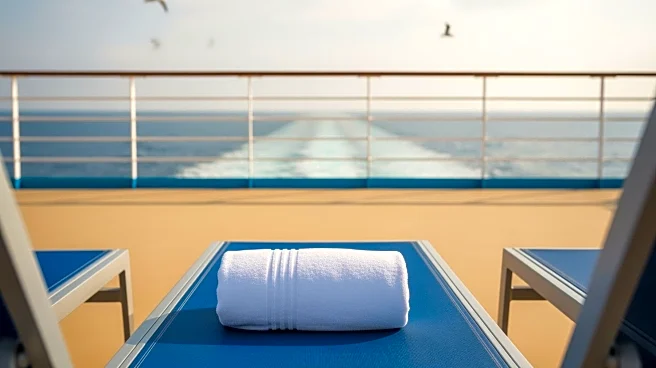What's Happening?
A norovirus outbreak has affected nearly 80 individuals aboard the Oceania Insignia cruise ship, according to the Centers for Disease Control and Prevention. Among the 637 guests, 74 reported symptoms of vomiting and diarrhea, along with one crew member.
The ship, which departed from Montreal on October 16, is scheduled to conclude its voyage in Boston on October 27. In response to the outbreak, Oceania Cruises has implemented enhanced cleaning and disinfection protocols and isolated those who are ill. The cruise line emphasized that the health and safety of its guests is a top priority, and all affected individuals are receiving treatment. This incident is part of a larger trend, as the CDC has recorded 20 outbreaks of gastrointestinal illness on cruise ships this year, with 15 attributed to norovirus.
Why It's Important?
The outbreak highlights ongoing challenges in managing infectious diseases on cruise ships, which are environments conducive to the spread of illnesses due to close contact among passengers. Norovirus, a highly contagious virus, is a common cause of gastrointestinal illness and can lead to significant disruptions in travel plans and operations for cruise lines. The incident underscores the importance of stringent health protocols and rapid response measures to protect passengers and crew. Additionally, the outbreak may impact the cruise industry's reputation and consumer confidence, potentially affecting bookings and revenue. The CDC's data suggests a newly dominant strain of norovirus is contributing to increased outbreaks, which could have broader implications for public health management both on land and at sea.
What's Next?
Oceania Cruises will continue to monitor the health of passengers and crew, adhering to CDC-approved protocols to manage the outbreak. The cruise line may face scrutiny from health authorities and the public, prompting potential reviews of its health and safety measures. As the ship approaches its final destination in Boston, further assessments will be made to ensure the containment of the virus. The CDC may also conduct additional investigations to understand the spread and impact of the norovirus strain, potentially leading to updated guidelines for cruise operators. Stakeholders in the travel and tourism industry will be watching closely to gauge the impact on future cruise operations and consumer behavior.
Beyond the Headlines
The outbreak raises questions about the ethical responsibilities of cruise lines in safeguarding passenger health and the effectiveness of current health protocols. It also highlights the need for improved communication strategies to inform passengers about potential health risks and preventive measures. Long-term, the industry may need to invest in advanced sanitation technologies and collaborate with health experts to develop more robust outbreak prevention strategies. The incident could also influence regulatory policies, prompting stricter oversight and requirements for health management on cruise ships.
















